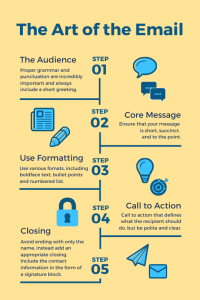By Communication Consultant Ross Bell (Management Consulting, ’23)
 As we enter the heart of professional recruiting season, you may be wondering what you should do to prepare for your first interview. According to experts, these are the four most important steps you can take to best prepare.
As we enter the heart of professional recruiting season, you may be wondering what you should do to prepare for your first interview. According to experts, these are the four most important steps you can take to best prepare.
Step #1: Conduct Research
According to the consulting firm Experis, researching the firm you are interviewing for is the most important thing you can do: “47% of the candidates failed the job interview because they didn’t have enough information about the company they applied to.” You should familiarize yourself with the company’s mission statement, their position within the industry, and the company’s competitive advantages.
In addition to researching the firm of interest, it is also helpful to understand the background of the professionals who will be conducting your interview. Most companies will brief you with a description of your interviewer’s role in the company, but it is important that you supplement this information with some research of your own. LinkedIn and the company’s website are great resources!
Step #2: Being prepared with a formal resume– and knowing it inside and out
Your resume should showcase your best skills and past experiences as succinctly and clearly as possible. Resumes come in all shapes and sizes– so be sure to research the ideal format of your industry of interest. The Center for Career and Professional Development on campus is an excellent resource to help with everything resume related. In addition to their resources on Handshake, students can also walk into their office hours for more individualized attention.
Step #3: Anticipate Frequently Asked Interview Questions and Understand The STAR Method
Regardless of what company you are interviewing for, the pool of qualitative interview questions is relatively small, according to CNBC Contributor Suzy Welch. At a minimum, you should be prepared to answer these popular interview questions:
- Tell me about yourself
- Tell me about a mistake you made
- What are your greatest strengths? What are your weaknesses?
- Why should we hire you?
All of these questions should be answered by using the STAR method. Begin with Situation– consider a time when you leveraged the skills they are asking you about. While describing your situation, be sure to define the Tasks that you were responsible for– what were your responsibilities, and how are they relevant to answering the question. The Tasks that you completed will then be supplemented by Actions– what specifically did you do that required the desired skills? Finally, conclude with the Results of the Situation– what was the impact of your actions and how do these skills relate to the interview question asked?
Interviewers are looking for you to show– not tell– your qualifications and skills. Reflecting upon experiences when you exhibited these skills will help frame a picture of who you are at your best.
Step #4: Develop 2-3 Questions for Your Interviewer
Asking questions is an excellent way to learn more about the company. It also tells your interviewer that you are interested in the position. According to Business Insider, you should not be afraid to inquire about your interview performance and how it compares to how an ideal candidate would perform: “Who do you think would be the ideal candidate for this position, and how do I compare?” If there is a mismatch between what your potential employer is looking for and your own skills, perhaps this is not the best position for you. It’s also important to inquire about the company’s core values and mission statement. You could ask, “Can you describe the working culture of the company?” Lastly, if you are unsure of the steps going forward, the end of the interview is a good time to ask your interviewer.
It is normal to be anxious for an interview, but thankfully there are ways to alleviate your stress. By conducting your own research, reviewing your work experience and leadership roles, and by anticipating interview questions, you can be better prepared. Soliciting feedback is also an excellent way to prepare, which you can do with The Communication Consultants at RCBC. Make an appointment! We are always eager to help improve your communication skills!
Get information and resources about our center at The Philip Rauch Center for Business Communication.
Works Cited:
20 Tips for Great Job Interviews (experis.com)
51 Great Questions to Ask in an Interview | The Muse
Suzy Welch: How to answer 7 of the most common interview questions (cnbc.com)
https://www.businessinsider.com/questions-to-ask-at-end-of-job-interview-2016-4
10 Questions to Ask After an Interview | Indeed.com

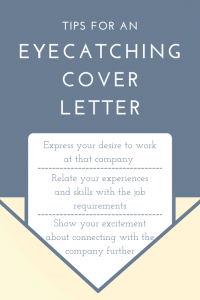 During the job application process, companies often will ask us for a cover letter to accompany our resume. You might be wondering: “What is a cover letter after all? Does it really matter?”
During the job application process, companies often will ask us for a cover letter to accompany our resume. You might be wondering: “What is a cover letter after all? Does it really matter?”  Xinyi Cui:
Xinyi Cui: 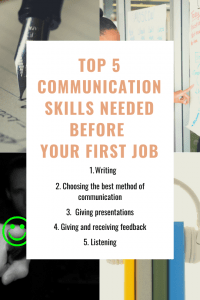 While practicing your elevator pitch before this month’s job fair, you may have wondered what other communication skills are important to master before starting your first job. According to experts, there are
While practicing your elevator pitch before this month’s job fair, you may have wondered what other communication skills are important to master before starting your first job. According to experts, there are 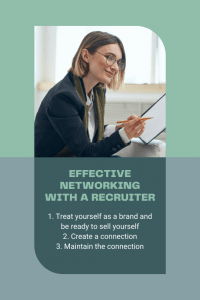 As students are busy with the fall semester, numerous companies have opened their application portals for externship programs, internships, and full-time positions. But before we jump to our final decisions and click “submit,” there is an essential step towards a successful and impactful application – effective networking. Specifically, even if we have connected with various professionals in advance, we ought not to ignore the power of networking with a recruiter.
As students are busy with the fall semester, numerous companies have opened their application portals for externship programs, internships, and full-time positions. But before we jump to our final decisions and click “submit,” there is an essential step towards a successful and impactful application – effective networking. Specifically, even if we have connected with various professionals in advance, we ought not to ignore the power of networking with a recruiter.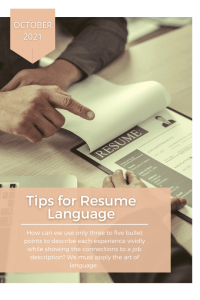 As we all know, a professional resume is formatted with brief, bullet point statements. Applicants have to show their most relevant and valuable experiences on one single page. How can we use only three to five bullet points to describe each experience vividly while showing the connections to a job description? We must apply the art of language.
As we all know, a professional resume is formatted with brief, bullet point statements. Applicants have to show their most relevant and valuable experiences on one single page. How can we use only three to five bullet points to describe each experience vividly while showing the connections to a job description? We must apply the art of language.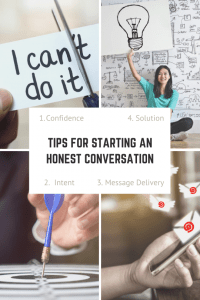 Have you ever disagreed with a group member(s) during a meeting but ended up not speaking up at all? It’s a common experience! But what triggers this norm of unwillingness to speak up during discussions?
Have you ever disagreed with a group member(s) during a meeting but ended up not speaking up at all? It’s a common experience! But what triggers this norm of unwillingness to speak up during discussions?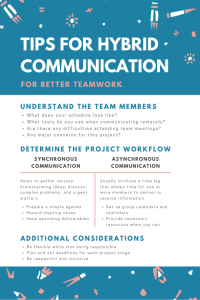 As our new semester kicks off on campus, we are now able to conduct more projects with team members in person. However, with uncertain situations related to the pandemic, we still need to communicate online in many situations. To better ensure smooth and effective communication, here are some tips and considerations for teamwork in a hybrid mode.
As our new semester kicks off on campus, we are now able to conduct more projects with team members in person. However, with uncertain situations related to the pandemic, we still need to communicate online in many situations. To better ensure smooth and effective communication, here are some tips and considerations for teamwork in a hybrid mode.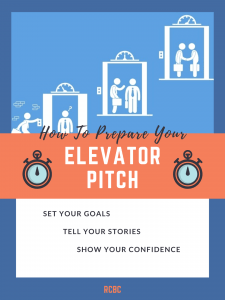 No doubt you have introduced yourself several times recently. It’s not very difficult to first say hello to a new acquaintance or to introduce ourselves at the start of a new class. We usually share our name, major, and where we live. Maybe we share some details about our hobbies or interests. But when we walk into a career fair or attend networking events, an introduction is not that easy. We need to be ready to talk briefly but specifically about our experiences, knowledge, skills, and interests. Creating and practicing an elevator pitch is an important part of our preparation.
No doubt you have introduced yourself several times recently. It’s not very difficult to first say hello to a new acquaintance or to introduce ourselves at the start of a new class. We usually share our name, major, and where we live. Maybe we share some details about our hobbies or interests. But when we walk into a career fair or attend networking events, an introduction is not that easy. We need to be ready to talk briefly but specifically about our experiences, knowledge, skills, and interests. Creating and practicing an elevator pitch is an important part of our preparation.